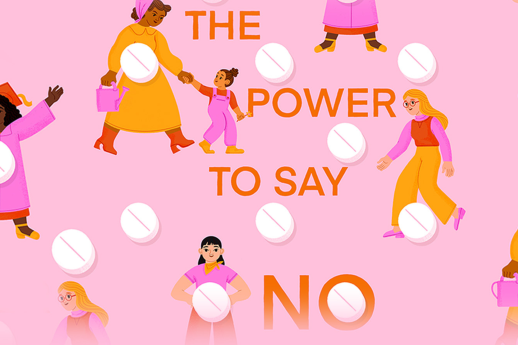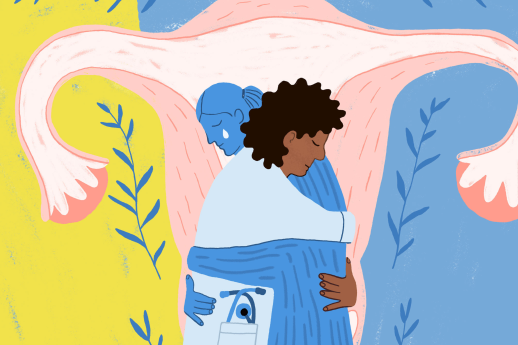For women and girls in the European Union, access to safe abortion care is a postcode lottery. A patchwork of policies and legislation shape whether abortion is free, safe, and legal. At the extreme end, a small minority of countries ban abortion in almost all circumstances, with devastating results. Most others allow abortion on a person’s own request or on broad social grounds, at least in the first trimester of pregnancy.
But the devil is in the detail, and the detail frequently changes. Many EU countries impose medically unnecessary requirements prior to care, such as compulsory and discouraging counselling and waiting times – going against World Health Organization advice. In 22 out of 27 countries, doctors are still allowed to deny care based on their own personal beliefs – with dire repercussions for access. Hard-won progress can be swiftly unpicked. Issues such as gestational time limits, parental consent, denial of care by medical professionals, and care for rape survivors – among many other issues – remain subject to fierce debate and legislative change.
These are debates that wreak havoc upon the lives of women and girls, but also their families. Denial of care is structural violence: in many of the 27 countries of the EU – a region that likes to present itself on the world stage as a model of progressive values – women and girls are harmed physically, emotionally, and mentally by abortion laws and policies, or the failure to uphold them.
International Safe Abortion Day (28 September) is a time to take stock of progress and threats to safe abortion access over the past year. This feature outlines some of the major developments in abortion legislation – good and bad – across the EU since last September.
The rise of the right-wing
Over the past few decades, the broad move in the EU has been towards liberalising laws around abortion care. Recently, however, the rise of chauvinist right-wing forces and politicians has seen energy and resources flooding into anti-abortion campaigns, fuelling structural violence against women and girls. In Italy, for example, the growing popularity of far-right and right-wing political parties, particularly in northern areas, has emboldened anti-abortion actors and legislators.
With this in mind, the following section runs through some of the main policies and laws that harm people by limiting access to abortion care, introduced over the past 12 months – many of them linked to the rise of far-right and right-wing campaigns and networks in Europe and further afield.
The growth of new anti-abortion legislation
Until recently, Malta was the only country in the EU to have a total ban on abortion. In June 2022, the government drew up new legislation, triggered by the case of American tourist Andrea Prudente who had to be airlifted to Spain for care after she suffered an incomplete miscarriage because doctors in Malta were banned and unwilling to intervene while foetal cardiac activity could be detected.
In the new bill, the government proposed amending the Criminal Code to allow abortions when a woman’s health was at grave risk – hailed as a small but crucial step to improve abortion care access in this staunchly Catholic country. In the final months of 2022, the bill made steady progress through parliament. However, protests by hardline reproductive bullies, who said the bill’s definition of a health risk was too wide, forced the government to back down and introduce amendments. When the legislation was finally approved in June 2023, parliament voted to allow abortion care only when a woman’s life was at risk, and only with the consent of three specialists – a major bureaucratic hurdle. Maltese reproductive rights experts say this new law will put women’s lives even more at risk than the previous status quo.
In Hungary, meanwhile, abortion is legal up to 12 weeks on medical grounds or if the woman is in severe crisis. But in September 2022, the country’s far-right government brought in by decree a measure that forces women seeking care to listen to embryonic cardiac activity before accessing healthcare. In response, IPPF European Network stated: “This requirement has no medical purpose and serves only to humiliate women. It will make accessing abortion more burdensome.”
The legislation was brought in without public consultation or without hearing from women.
when
region
European Network
Subject
Abortion Care

According to IPPF EN, it is “the latest in a series of measures imposed by the government to undermine women’s autonomy.” Others include mandatory counselling sessions that seek to dissuade women from accessing abortions, “with the sole result of humiliating and undermining [women’s] emotional health.”

This legislation has also had a small but significant ripple effect within the EU. Far-right local government leaders in the Castile region of Spain, for example, have drawn on the Hungarian example to push for a similar legislative measure. So far, their efforts have been thwarted by the former Socialist central government, which told the regional government to drop “any actions that would infringe laws on sexual and reproductive health and the voluntary interruption of a pregnancy.”
In Slovakia, where abortion is legal on request until 12 weeks (and later for medical reasons), there have been repeated attempts to further restrict it. Policymakers have tried to introduce forced and biased counselling and to increase mandatory waiting times: politicians put bills on parliament's agenda every six months, with more than 20 bills since 2018. Meanwhile, more than 70 medical institutions in Slovakia do not provide abortion at all, and medical abortion is illegal.
Arbitrary and harmful barriers to care
Even in countries where abortion is legal on request, women can be denied access. In Italy, for example, abortion up to 12 weeks has been legal since 1978 but access to care remains massively uneven because health workers deny care based on personal beliefs: up to 64.6% of gynaecologists and 44.6% of anaesthetists object to abortion; many hospitals have objection rates of up to 80%.
When the new right-wing government of Georgia Meloni won power in October 2022, it stoked fears that they would tighten up access to abortion, coupled with rhetoric around boosting Italy’s dwindling birth rate. So far, Meloni’s government has not touched the so-called ‘194 law’ which legalised abortion in 1978. But in October 2022, members of her coalition drafted proposals for laws giving legal standing to the foetus from conception, which would indirectly make abortion illegal. There are also fears that Meloni will call for laws on safe abortion access to be ignored.
In Portugal, where abortion is legal up to 10 weeks, access is shaped by rules allowing doctors to refuse to perform procedures. In February 2023, the government admitted “specific cases” of people finding it difficult to access abortions. It promised to follow up on a recent survey which reveals that hospitals across the country are refusing abortion care.
The fight over access to medical abortion

Options: Kimberlie Wong for IPPF x Fine Acts
Kimberlie Wong for IPPF x Fine ActsAcross Europe as a whole, medical abortion (abortion brought on by taking a pill) accounts for at least half of all abortions, with at least 90% taking place before 13 weeks. But there are huge discrepancies in access. A handful of countries do not allow medical abortion: it is outlawed in the hardline anti-abortion legislation of Poland and Malta of course, but also banned in countries, such as Slovakia and Hungary.
In Poland, the case against Justyna Wydrzynska, a SRHR defender who had helped a woman in an abusive relationship to access abortion pills, rumbled on all year. In March 2023, she was finally found guilty and sentenced to eight months of community service, and will now have a criminal record. Wydrzynska’s case is the first time a SRHR defender has been charged with helping someone get abortion care since Poland’s right-wing Law and Justice (PiS) government engineered a virtual ban on abortion in 2021.

Irene Donadio of the IPPF European Network stated: “We are in awe of Justyna’s bravery in the face of 18 months of judicial persecution by an apparatus targeting anyone who dares challenge the state’s immoral attacks on healthcare and human rights.”

Denial of care for rape survivors
For refugees within the EU, there are major gaps and barriers to sexual and reproductive healthcare access – including abortion care – and sexual and gender-based violence support services. A 2023 report by the Centre for Reproductive Rights looked at the experiences of refugee women and girls from Ukraine in Hungary, Poland, Romania, and Slovakia. It found that thousands of refugees are unable to access appropriate care in host countries. This forces some to pursue illegal, unsafe avenues, while others decide to make the dangerous journey back to Ukraine to access care.
The report calls for major revisions to refugee response strategies, to tackle intersectional discrimination across the EU response, and for clear SRH information in relevant languages, among other recommendations.
Beyond the dramatic experiences lived by refugees, women living in Poland who become pregnant as a result of a rape are virtually denied access to abortion in practice, despite it being legal; and survivors in Malta are denied the right to abortion by law. Let’s be clear: denying access to abortion care to a victim of sexual violence constitutes a form of gender-based violence in itself, and causes them such great harm that it may amount to torture.
The recent decision of the Council of the EU to water down the already limited language on access to medical care for victims in the draft EU Directive to Combat Violence Against Women and Domestic Violence is “inexcusable”. Early in June 2023, member states failed to include better provision of comprehensive healthcare for victims.
“Victims of sexual violence have much broader health needs [beyond forensic examinations], which the Council’s position largely fails to address,” said Camille Butin of IPPF EN. “The EU needs to guarantee that they can access comprehensive, essential, and timely healthcare. Otherwise, governments will fail to support women and girls fully and protect them from further harm.”
Members of European Parliament listened to campaigners’ concerns. On 28 June 2023, the EU added vital amendments on the inclusion of a full range of sexual and reproductive healthcare – including abortion care – for victims of sexual violence.

Care for all: Tanya Shyka for IPPF EN
Tanya ShykaVoices of structural violence draw on global anti-rights networks
The anti-abortion movement is well organised and well-funded. Its campaigns are increasingly underpinned by stronger coordination between anti-abortion politicians and illiberal groups in EU states. Many such coercive actors have links to powerful anti-abortion funders in the United States – relationships likely to deepen as the US heads for elections in 2024, and with Roe v. Wade shaping debates and stoking divisions in the US and globally.
In Ireland, meanwhile, coercive groups incensed by Ireland’s landmark referendum on abortion in May 2018 – when Irish citizens voted by a landslide to legalise abortion care – are using the overturning of Roe v. Wade as a springboard to push for their own changes. This is yet another example of how the economic and political heft of heavyweight countries like the US can have ramifications far beyond their borders.
Positive steps to protect the wellbeing of all
Amid major threats to abortion care for women and girls in the EU, there have also been reasons to rejoice this year. Below, we put the spotlight on some of the ways that tireless campaigning has led to hard-won victories – from the relaxation of parental consent rules in Spain and Denmark, to new protections for abortion clinics in the UK and Ireland.
Major reforms offer hope for women and girls
In December 2022, Spain’s parliament passed a law removing requirements for girls aged 16-17 to gain parental/guardian consent for care. The new legislation also brings an end to arbitrary and medically unnecessary three-day waiting periods, and introduces a registry of health workers who deny care based on personal beliefs. But there has been sustained opposition from the Catholic Church and right-wing politicians – something to watch in the months to come.
The June 2023, in Denmark, the government announced its support for liberalising existing abortion laws. This would eliminate the requirement for parental consent for young people aged 15-18 needing abortion care.
In September 2023, the Danish National Centre for Ethics (Etisk Råd) recommended the country changes its limit to access abortion care on an individual’s own request from the current 12 weeks to 18 weeks.
Protecting patients and care providers
In the UK, Northern Ireland, and Ireland, the past year has seen new protections for safe access zones outside abortion clinics and organisations providing information, advice, or counselling. This week, safe access zones across all five of Northern Ireland’s health trusts went live: the zones span an area 100-250 metres from entrances or exits of protected premises, and will prohibit activities such as anti-abortion protests.
New freedoms in the face of adversity
There have been silver linings to be found within the fallout from calamitous events, too, this year. The repeal of Roe v. Wade led Finland to broaden abortion access by removing the requirement for two medical certificates. The new law permits abortion upon the pregnant individual's request alone during the initial 12 weeks of pregnancy and became law on 1 September 2023.
In July 2022, a survey in France revealed that 81% of people want abortion care to be better protected in the wake of Roe v. Wade, and MPs on the left and centre have called for new steps in the wake of US developments. Over the past year, the French parliament has debated enshrining the right to abortion in the Constitution – a move given the green light by a large majority of the lower house in November 2022.
The idea has support at the EU level too, with the European Parliament supporting including the right to abortion within the EU's Charter of Fundamental Rights.
Together towards a brighter future
In the face of mounting challenges and the run-up to European elections in 2024, the European Union must stand up for democracy and the progressive ideas and human rights that have long underpinned its vision and values. Sexual and reproductive health and rights (SRHR) – including the right to free, safe, and legal abortion – are intrinsic to these values, undeniably linked to gender equality, and must not be jeopardised. With coercive movements lining up to turn the lives and bodies of women and girls into battlefields, there is no room for complacency. The EU needs a unified approach that draws on the experiences and expertise of people across the length and breadth of the region.
This means unlocking resources for reform, shoring up progressive policies, making relationship and sexuality education more accessible, drawing on the power of the media to advocate for our collective rights, protecting and funding human rights defenders, and building networks across communities, countries, and regions. Keeping chauvinist forces at bay will require agility, grit, and determination, but if we work together, we can keep creating the kind of society that EU communities deserve. Together, nations must act so that all people – in Europe and around the world – can enjoy equal rights and lead free and safe lives, free from discrimination and violence of any kind.
***

This article was funded by the European Union through the Citizens, Equality, Rights and Values Programme.
Disclaimer: Views and opinions expressed are those of IPPF EN and do not necessarily reflect those of the European Union or the European Commission. Neither the European Union or the European Commission can be held responsible for them.











